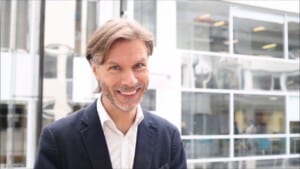Our partnership with the NHS Clinical Entrepreneur Programme
Investing in the largest entrepreneurial workforce development programme for clinicians
We are partnering with the NHS Clinical Entrepreneur Programme, the world’s largest entrepreneurial workforce development programme for clinicians. Funded by NHS England and founded in 2015 by Professor Tony Young OBE (a practising NHS surgeon and Director of Medical Innovation at Anglia Ruskin University), the programme has helped more than 500 NHS clinicians gain the skills, knowledge and experience to transform the way health and care is delivered. The impact of this support and mentoring has been the creation of around 250 life-science companies, 347 innovations and £270m of investment.
The programme involves partnerships across the NHS and with industry and charities and is designed to unlock the entrepreneurialism of the country’s clinicians by giving them the commercial skills, knowledge and access to partners and sources of funding to turn their ideas into reality. According to Professor Young,
‘Not all the latest, greatest things are being developed in research labs or universities but are actually coming out of the minds of clinicians. They are best placed to identify the key problems and challenges experienced on the front line. Our aim is to get the ideas out of the labs, out of the clinics, out of clinicians’ heads and minds and get them into a business, so they’re making a tangible difference to patient care.
‘We traditionally supported clinicians with academic and research ideas, but there wasn’t the same level of support if they had entrepreneurial ideas. Not every clinician has the desire to become an entrepreneur, but the commercial skills they develop on the programme will benefit them as they move up the ladder within the NHS into leadership positions. Bringing a start-up mindset to some of the challenges we face in healthcare will unlock new thinking and new approaches to the ways in which we work within the NHS.’

Orthopaedic and musculoskeletal specialists are well represented among the clinicians attending the programme, which has helped companies related to orthopaedics raise tens of millions of pounds. The discipline appears to attract inventive and entrepreneurial people, just like our founder and benefactor Ronald Furlong, who in addition to being a pioneering surgeon was responsible for a revolution in artificial joint and implant design. One of the first innovations developed as part of the programme was Touch Surgery, an interactive surgical simulation platform that allows surgical trainees to work through a virtual operation and then compare their approach with that of leading surgeons. It has been used by over three million surgical trainees around the world and was recently acquired by medical technology company, Medtronic.
ORUK is one of a number of charities working alongside the NHS Clinical Entrepreneur Programme. The expertise and knowledge it can provide is valued by Professor Young,
‘ORUK brings lots of experience, lots of networks, lots of connections into patient groups and into clinical groups and charities are often able to address different problems than the commercial sector might address and fund initiatives that may not necessarily be commercially viable but represent a real patient need. There will be a large number of great musculoskeletal ideas developed by our clinicians, that ORUK can support.’
Professor Young is a passionate advocate of the value of a cross-disciplinary approach that brings diversity of thought and opinion to healthcare challenges:
‘If you really want to find the solutions, you need broad partnerships, from global technology and life science companies, through to charities like ORUK with a shared aim of improving patient care through getting the latest, greatest innovations available to patients.
‘We are delighted that ORUK is one of our founding partners and supporter of this new endeavour, which is not something that’s been done anywhere else in the world – a national level workforce development programme in health care focused on entrepreneurism. I invite other research related charities to see the kind of trailblazing way that ORUK is stepping forward.’